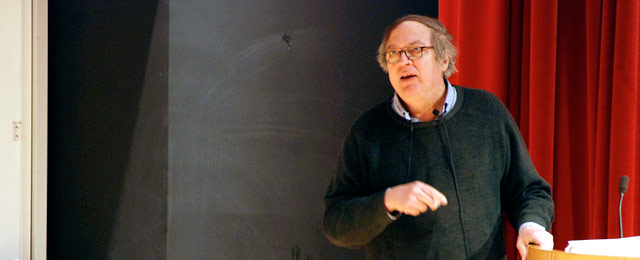Online courses directory (457)
This course is a survey of world economic history, and it introduces economics students to the subject matter and methodology of economic history. It is designed to expand the range of empirical settings in students' research by drawing upon historical material and long-run data. Topics are chosen to show a wide variety of historical experience and illuminate the process of industrialization. The emphasis will be on questions related to labor markets and economic growth.
When John Locke declared (in the 1690 Essay Concerning Human Understanding) that knowledge was derived solely from experience, he raised the possibility that human understanding and identity were not the products of God's will or of immutable laws of nature so much as of one's personal history and background. If on the one hand Locke's theory led some to pronounce that individuals could determine the course of their own lives, however, the idea that we are the products of our experience just as readily supported the conviction that we are nothing more than machines acting out lives whose destinies we do not control. This course will track the formulation of that problem, and a variety of responses to it, in the literature of the "long eighteenth century." Readings will range widely across genre, from lyric poetry and the novel to diary entries, philosophical prose, and political essays, including texts by Alexander Pope, Jonathan Swift, Mary Astell, David Hume, Laurence Sterne, Olaudah Equiano, Mary Hays, and Mary Shelley. Topics to be discussed include the construction of gender identities; the individual in society; imagination and the poet's work. There will be two essays, one 5-6 pages and one 8-10 pages in length, and required presentations.
For anyone with an interest in learning about one of the oldest and most influential legal systems in the world.
You will gain a foundation for college-level writing valuable for nearly any field. Students will learn how to read carefully, write effective arguments, understand the writing process, engage with others' ideas, cite accurately, and craft powerful prose. We will create a workshop environment.
We understand the world — and our selves — through stories. Then some of those hopes and fears become the world.
This course will focus on the myths of ancient Greece and Rome, as a way of exploring the nature of myth and the function it plays for individuals, societies, and nations.
What does it mean for an immigrant to become a U.S. citizen? Through a background of historical and policy perspectives, this course will examine U.S. law governing how citizenship is acquired, the constitutional and international law foundations underlying immigration regulation, the role of the federal government in regulating immigration, and immigration law reform.
A survey of how America has become the world's largest consumer of energy. Explores American history from the perspective of energy and its relationship to politics, diplomacy, the economy, science and technology, labor, culture, and the environment. Topics include muscle and water power in early America, coal and the Industrial Revolution, electrification, energy consumption in the home, oil and U.S. foreign policy, automobiles and suburbanization, nuclear power, OPEC and the 70's energy crisis, global warming, and possible paths for the future.
Great managers are made, not born. Learn about the qualities and skills of great managers in this Business 101 course. Instructor Sherri Hartzell holds both an MBA and Ed.D., so she's an excellent choice to teach you about principles of management.
Start by learning about the different levels of management in organizations and then dive into how good managers lead to great employees. Students of business, budding entrepreneurs and independent online learners alike can benefit from these short, engaging video lessons and interactive online quizzes. Business 101: Principles of Management can prepare you to earn real, widely transferable college credit by taking the Principles of Management CLEP exam or the Excelsior Principles of Management exam .
This course offers a broad survey of modern European history, from the end of the Thirty Years' War to the aftermath of World War II. Along with the consideration of major events and figures such as the French Revolution and Napoleon, attention will be paid to the experience of ordinary people in times of upheaval and transition. The period will thus be viewed neither in terms of historical inevitability nor as a procession of great men, but rather through the lens of the complex interrelations between demographic change, political revolution, and cultural development. Textbook accounts will be accompanied by the study of exemplary works of art, literature, and cinema.
This subject surveys main currents of European cultural and intellectual history in the modern period. Such a foundation course is central to the humanities in Europe. The curriculum introduces a set of ideas and arguments that have played a formative role in European cultural history, and acquaints them with some exemplars of critical thought. Among the topics to be considered: the critique of religion, the promise of independence, the advance of capitalism, the temptations of Marxism, the origins of totalitarianism, and the dialects of enlightenment. In addition to texts, we will also discuss pieces of art, incl. paintings and film.
This course uses scale models to design environments that orchestrate contrasting material properties and conventional constructional systems to create places that foster specific ways of inhabiting space. It also demonstrates how architecture differs from other forms of design. Intended for students to test aptitude for architectural design and to experience an unfamiliar mode of thought, it's conducted in a studio format, with lectures on architectural theory and history, and structured for students with no previous experience in design.
Required of Architecture majors.
This course will introduce you to some of the most important areas of research in contemporary philosophy. Each week a different philosopher will talk you through some of the most important questions and issues in their area of expertise.
An investigation of the nature and limits of self-knowledge from the viewpoints of philosophy, psychoanalysis, experimental psychology, neuroscience, aesthetics, and Buddhism.
Learn the ideas and vocabulary for listening to world music, and examine the music of several world music cultures and how they have entered into mainstream popular culture.
In this class, you will learn how to think with models and use them to make sense of the complex world around us.
ModPo is a fast-paced introduction to modern and contemporary U.S. poetry, with an emphasis on experimental verse, from Dickinson and Whitman to the present. Participants (who need no prior experience with poetry) will learn how to read poems that are supposedly "difficult."
Financial institutions are a pillar of civilized society, supporting people in their productive ventures and managing the economic risks they take on. The workings of these institutions are important to comprehend if we are to predict their actions today and their evolution in the coming information age. The course strives to offer understanding of the theory of finance and its relation to the history, strengths and imperfections of such institutions as banking, insurance, securities, futures, and other derivatives markets, and the future of these institutions over the next century.
In this class, food serves as both the subject and the object of historical analysis. As a subject, food has been transformed over the last 100 years, largely as a result of ever more elaborate scientific and technological innovations. From a need to preserve surplus foods for leaner times grew an elaborate array of techniques – drying, freezing, canning, salting, etc – that changed not only what people ate, but how far they could/had to travel, the space in which they lived, their relations with neighbors and relatives, and most of all, their place in the economic order of things. The role of capitalism in supporting and extending food preservation and development was fundamental. As an object, food offers us a way into cultural, political, economic, and techno-scientific history. Long ignored by historians of science and technology, food offers a rich source for exploring, e.g., the creation and maintenance of mass-production techniques, industrial farming initiatives, the politics of consumption, vertical integration of business firms, globalization, changing race and gender identities, labor movements, and so forth. How is food different in these contexts, from other sorts of industrial goods? What does the trip from farm to table tell us about American culture and history?
Advances in cognitive science have resolved, clarified, and sometimes complicated some of the great questions of Western philosophy: what is the structure of the world and how do we come to know it; does everyone represent the world the same way; what is the best way for us to act in the world. Specific topics include color, objects, number, categories, similarity, inductive inference, space, time, causality, reasoning, decision-making, morality and consciousness. Readings and discussion include a brief philosophical history of each topic and focus on advances in cognitive and developmental psychology, computation, neuroscience, and related fields. At least one subject in cognitive science, psychology, philosophy, linguistics, or artificial intelligence is required. An additional project is required for graduate credit.
Trusted paper writing service WriteMyPaper.Today will write the papers of any difficulty.

















